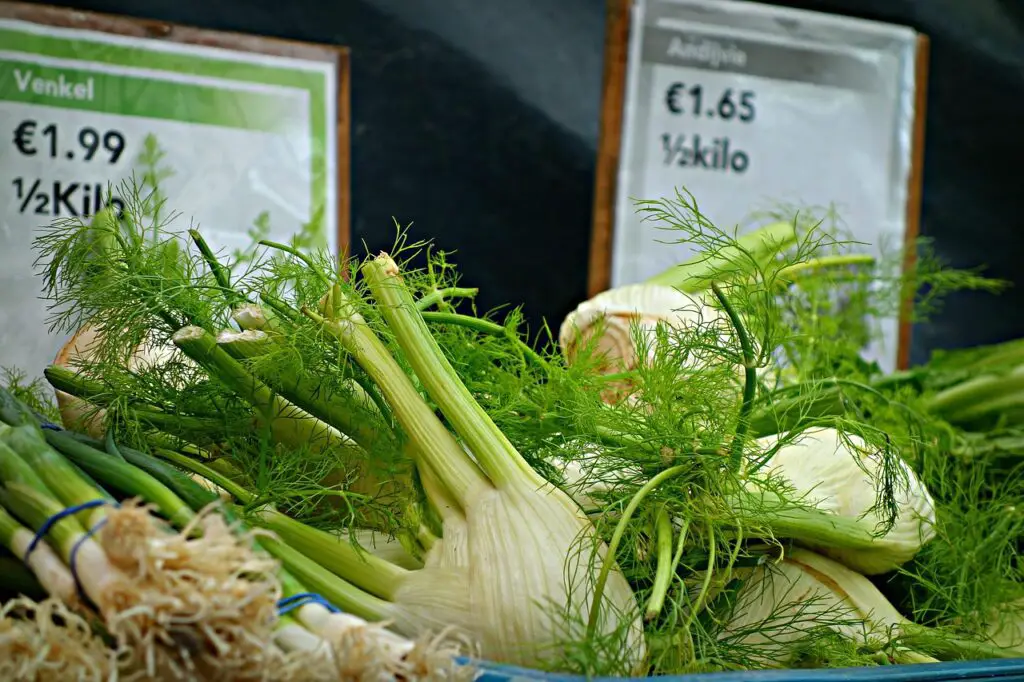Fennel is a flavorful and nutrient-packed vegetable that offers numerous health benefits for humans. But what about dogs? Can dogs eat fennel?
The good news is that fennel is generally safe and even healthy for dogs to eat in moderation.
In fact, fennel can help freshen your pup’s breath, aid in digestion, and provide a rich source of vitamins and minerals.
However, there are certain precautions to take when feeding fennel to your dog, as well as different ways to prepare it to make it more appealing to your furry friend.
Read on to learn more about how to incorporate fennel into your dog’s diet.
Can Dogs Eat Fennel?

Yes, dogs can eat raw, cooked, and pureed fennel in moderation as it can offer numerous health benefits.
Fennel is a good source of dietary fiber, vitamins C and K, potassium, and other essential nutrients that can support your dog’s overall health.
Additionally, fennel can freshen your dog’s breath and improve digestion.
However, it’s essential to remember that dogs have different nutritional needs than humans, and excessive consumption of fennel can cause digestive issues such as gas, bloating, and diarrhea.
Furthermore, fennel seeds can be a choking hazard for dogs, especially smaller breeds. As with any treat, it’s crucial to feed fennel to your dog in moderation and to prepare it in a way that’s safe and easy for them to digest.
If you’re ever unsure about whether or not a particular food is safe for your dog to eat, consult with your veterinarian for guidance.
See also: 47 Safe Vegetables To Feed Your Dog. Puppy Power!
How Many Fennels Can Dogs Eat?

The recommended amount of fennel for dogs to eat depends on their size and dietary needs.
As with any treat or food, moderation is key when feeding fennel to your furry friend.
It’s generally safe to feed your dog a small amount of fennel, a few small pieces of the fennel bulb, depending on the dog’s size.
However, always start with a small amount and monitor your dog’s reaction, as excessive consumption of fennel can cause digestive issues such as gas, bloating, and diarrhea.
Additionally, fennel seeds can pose a choking hazard for dogs, so it’s best to avoid giving them to your pup altogether.
If you’re ever unsure about how much fennel to feed your dog, consult your veterinarian for guidance based on your dog’s individual needs.
Fennel Feeding Chart According To Size
| Food | Size | Portion |
|---|---|---|
| Fennel | Toy dogs | 1 small fennel bulb |
| Fennel | Small dogs | 1 small fennel bulb |
| Fennel | Medium dogs | 1 – 2 fennels bulb |
| Fennel | Large Dogs | up to 3 fennels bulb |
Fennel Feeding Chart According To Age
| Food | Age | Portion |
|---|---|---|
| Fennel | 0 – 6 months | Don’t feed |
| Fennel | 6 – 12 months | 1 small fennel bulb |
| Fennel | 12 – 24 months | 1 – 2 fennels bulb |
| Fennel | 24+ months | up to 3 fennels bulb |
How Often Can Dogs Eat Fennel
As with any new food, it’s best to start with a small amount of fennel and observe how your dog reacts to it.
If your pup seems to tolerate fennel well, you can offer it as an occasional treat or supplement to their regular diet.
Generally, it’s safe for dogs to eat fennel a few times a week, depending on their size and dietary needs.
However, it’s important to remember that fennel should be given in moderation, as excessive consumption can cause digestive problems in dogs.
It’s also crucial to prepare fennel in a way that’s safe and easy to digest, such as steaming or pureeing.
Health Benefits of Fennel To Dogs
- Aids Digestion. Fennel has anise, which is known to have antispasmodic properties that can help relax the digestive process in dogs, alleviate bloating, and promote healthy bowel movements.
- Freshens Breath. Fennel’s pleasant licorice-like taste can provide a refreshing breath while its essential oil is believed to help rid the mouth of harmful bacteria that cause bad breath.
- Rich in Nutrients. Fennel is an excellent source of dietary fiber, vitamin C, and potassium, essential nutrients that your dog needs to maintain good health.
- Anti-inflammatory effects. Fennel and the essential oils in its seed and bulb have anti-inflammatory effects that can help alleviate sore muscles, joint pains, and aches in dogs.
- Boosts Immunity. Fennel has vitamin C and other phytonutrients that can boost your dog’s immune system, protecting them from infections and illnesses.
- Helps Regulate Blood Pressure. Fennel contains potassium, a mineral that helps regulate blood pressure, which can prevent high blood pressure and reduce the risk of heart disease in dogs.
Potential Risks of Feeding Fennel To Dogs
- Digestive Issues. While fennel can aid digestion, excessive consumption can lead to digestive issues such as diarrhea, flatulence, and bloating.
- Allergic Reactions. Some dogs may be allergic to fennel or other plants in the same family, such as carrots, celery, and parsley, leading to allergic reactions.
- Choking Hazard. Fennel seeds can pose a choking hazard, particularly for smaller dogs that might not chew their food properly.
- Medication Interactions. Fennel can interact with some medications, particularly blood thinners, so it’s important to check with your veterinarian before feeding fennel to your dog if they’re taking medication.
- Risk of Overhydration. Fennel can have a diuretic effect, leading to excessive urination, which could increase the risk of overhydration or dehydration, particularly in older or sick dogs.
- Pesticide Exposure. Fennel, like other fruits and vegetables, can contain pesticides, which could be harmful to your dog’s health, so it’s important to choose organic fennel to avoid any potential pesticide exposure.
Nutritional Benefits of Fennel For Dogs
| Fennel Nutrition Facts per 100 grams | % DV * |
|---|---|
| Calories | 31 |
| Total Fat | 0.2 g |
| Cholesterol | 0 mg |
| Sugar | 3.4 g |
| Glycemic Index | 55 |
| Sodium | 52 mg |
| Carbs | 7 g |
| Protein | 1.2 g |
| Vitamin D | 0% |
| Calcium | 4% |
| Iron | 3% |
| Potassium | 414 mg |
Are Dogs Sensitive To Fennel?
While fennel is generally safe for dogs to eat, some dogs may be sensitive to it. Here are some symptoms of fennel sensitivity in dogs:
- Vomiting – Some dogs may vomit after eating fennel. Vomiting can occur due to an allergic reaction to fennel, or excessive consumption that upsets the stomach.
- Diarrhea – Fennel can stimulate bowel movements, which can lead to diarrhea in some dogs. This condition can be accompanied by abdominal pain and discomfort.
- Skin rashes – Dogs who are allergic to fennel may develop skin rashes or hives. The rashes can appear on any part of the body but are most common on the face, paws, and belly.
- Difficulty breathing – In severe cases, dogs may experience difficulty breathing or even anaphylactic shock, which can be life-threatening.
If you notice any of these symptoms in your dog after feeding them fennel, stop giving them the vegetable immediately and consult your veterinarian.
They may recommend an allergy test to confirm if your dog is allergic to fennel or require treatment to manage any symptoms of sensitivity.
How To Prepare Fennel For Dogs
Raw
Simply chop up the fennel bulb into small pieces and offer it to your dog as a crunchy and healthy snack. Make sure to remove the tough outer layer and core before feeding it to your pup.
Steamed
Steaming fennel can make it more digestible for dogs while still retaining its nutritional benefits. Cut the fennel into bite-sized pieces and steam it until it is soft and tender.
Pureed
For dogs who have difficulty chewing or digesting fibrous vegetables, pureeing fennel can be a great option. Steam the fennel until it’s soft and then blend it in a food processor or blender until it becomes a smooth puree. You can mix the pureed fennel into your dog’s regular food or offer it as a standalone treat.
How Fast Will Dogs Digest Fennel
The speed at which dogs digest fennel can vary depending on various factors, such as age, size, and overall health.
Typically, dogs can digest fennel within six to eight hours of consumption, but it can take longer for some dogs.
Digestion time can also depend on how you prepare the fennel.
For instance, raw fennel pieces may take longer to digest, while steamed or pureed fennel can be more digestible for dogs.
Keep in mind that excessive intake of fennel can cause digestive issues such as bloating, flatulence, and diarrhea, so it’s best to feed fennel to your dog in moderation.
If your pet shows any signs of discomfort or unusual digestive symptoms after eating fennel, contact your veterinarian for professional advice.
In Conclusion
In conclusion, dogs can safely eat fennel in moderation and can even benefit from its numerous health properties.
Fennel can aid in digestion, freshen breath, boost immunity, and regulate blood pressure, making it an excellent addition to your dog’s diet.
However, it’s essential to remember that every dog is different, and excessive consumption of fennel can cause digestive issues, allergic reactions, and choking hazards.
Pesticide exposure in fennel is also something to consider, so choosing organic fennel is always the best option.
Always start with small amounts of fennel, monitor your dog’s reaction, and consult your veterinarian anytime you have concerns or questions about feeding your dog fennel.
By feeding fennel to your dog in moderation and preparing it safely, you can help ensure your furry friend gets the nutrients they need to stay healthy and happy.


Leave a Reply